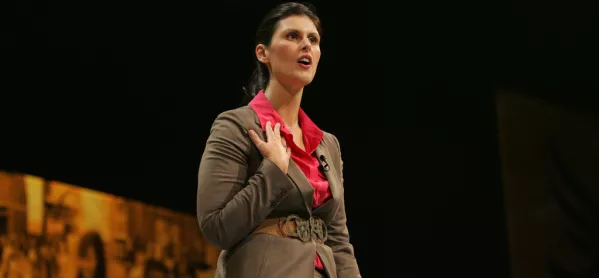“Schools are a place of expression,” stated Liberal Democrat education spokesperson Layla Moran, writing for Tes this week. “We must encourage pupils to explore their aspirations and individuality,” she continued.
This MP’s message is striking. She says: “I want to tear up the rule book when it comes to our education system; the relentless testing, the archaic standards structures, but most importantly, how we measure the success of our schools. Our focus should be on wellbeing, culture and on building individuals ready to take on and change the world.”
That makes a change from the usual policy-maker blather about EBacc, standards, targets and employability, and the ostrich-like ministerial insistence on propping up a creaking and inhuman accountability system. Ordinarily this might have made for a diverting utopian read, but otherwise have been of no practical value. After all, what chance do the Lib Dems have of exercising power?
The last time Vince Cable’s lot had a sniff of it, it ended badly. When that small party formed the coalition government in 2010, optimists like me saw a pattern for the future. Sadly, in 2015 voters decided that the Lib Dems’ willingness to compromise on university tuition fees represented not the necessary give-and-take of consensual government, but betrayal. They were wiped out.
Now they’re back. After their triumph in the recent Euro-vote they’re leading the Westminster polls. A sizeable chunk of the electorate has lost faith in the major parties, riven as they are by differences over Brexit while simultaneously so polarised that only the Lib Dems appear to occupy the middle ground (the electoral battleground for most of the 21st century). So maybe it would finally be useful to look at what a Lib Dem government might do for education if given power, or at least a share of it. Would Moran (who happens to be my MP) have her views echoed by the rest of the party?
And would she, I wonder, share in turn the educational outlook of Thomas’s Battersea, the school at which Princess Charlotte will join her brother Prince George in September? On their website they state: “Whilst we are proud of our record of senior school entrance and scholarship successes, we place a greater emphasis on a set of core values, which include kindness, courtesy, confidence, humility and learning to be givers, not takers. We hope that our pupils will leave this school with a strong sense of social responsibility, set on a path to become net contributors to society and to flourish as conscientious and caring citizens of the world.”
Following the announcement of family Cambridge’s school decision all those years ago, I scoured the web for articles tearing into the £21,000-a-year establishment. Perhaps I didn’t look hard enough, but I found not a single commentator decrying that fuzzy mission statement drawn from the school’s website, which also proclaims that “art, ballet, drama, ICT, French, music and PE [are] all taught by specialist teachers from a child’s first day”.
Lucky Charlotte and George! What’s not to like? But I can’t help feeling that, had this story concerned an “ordinary” child, and had Thomas’s been a state school, some commentators might have criticised a school that professed such wishy-washy aims instead of concentrating on the serious business of standards, literacy and numeracy, and baulked at the allocation of significant resources to such non-core activities as art, ballet, drama and music.
Perhaps those harsh voices are silent because they take for granted that such an expensive fee-paying school also achieves awesome academic standards, another assumption generally withheld from the state school down the road. But two questions strike me.
First, why is such a rich and wonderful educational offer apparently the preserve of the mind-bogglingly rich? Second, why does the system make it so hard for ordinary schools to set such “soft” outcomes – happiness, wellbeing, culture, generosity, aspiration and individuality – as their fundamental educational goals for their pupils?
Maybe, just maybe, an opportunity will emerge from the current political chaos for Layla Moran to lead the way in envisaging a kinder and happier educational offer for our children: not just for those up the posh end of Battersea, but for all.
Dr Bernard Trafford is a writer, educationalist, musician and former independent school headteacher. He tweets @bernardtrafford





